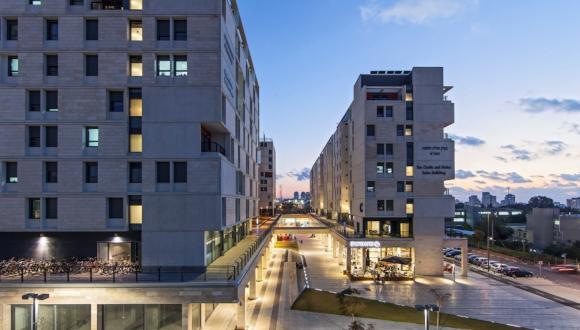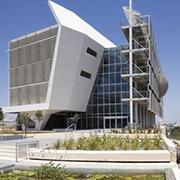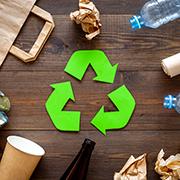Student City Project
Green building means building that is environmentally - and user-friendly, including saving and efficient use of new resources, reusing and recycling as much as possible, while striving to safeguard the health and quality of life of all the building’s users, now and in future generations.
In 2008 Tel Aviv University and Shikun & Binui Realty Company signed a contract in which the Shikun & Binui Group undertook responsibility to renovate and upgrade the Einstein student dormitory compound, to build another new dormitory building on the Broshim compound, and to operate both sites. According to the agreement the dormitories would be green compounds, designed in accordance with recent trends that take environmental quality into account, including designing and performing construction works and renovations using suitable materials, installing solar energy systems to product electricity, separating and recycling waste, and more.
Planning for the improved dormitories compound was done while taking into consideration worldwide trends for waste recycling and green environment. As part of the project solar systems were installed on the roofs of the dorm buildings, with the ability to product 40-50 kW of power; in total, the system is supposed to produce some 140 kW of electrical power from solar energy. Installation was done by Shikun & Binui and the Solaria company. Some of the clean energy being produced is for the students’ benefit and reduces electricity costs in the dorms.
Among the technologies included in renovating the Einstein compound:
- Vegetation - bushes that "guzzle" water will be removed and water-saving plants will be planted instead, as well as a water-saving irrigation system.
- Bicycle parking facilities - bike stands will be designed where students can lock their bicycles outdoors.
- Waste separation - the addition of bins for separation of waste (paper, plastic, glass, organic).
- Energy production installations - we are looking into installing an electricity generating installation using photovoltaic cells.
- Paint - use of "green" paints produced by Tambour to pain walls, metal and wood elements, and the "green" profile paints made by Klil.
- Saving water - installing water-saving devices on all faucets in the compound that will result, according to the manufacturer’s report, in a savings of 70% in the quantity of water used.
Technologies included in renovating the Broshim compound:
- Building materials - use of building materials that comply with Israel Standard 5098 for content of radioactive elements in building materials, use of "green" paints, etc.
- Recycling construction waste - mainly by reusing excavated soil.
- Saving water - installing water-saving devices on all faucets in the compound that will result, according to the manufacturer’s report, in a savings of 70% in the quantity of water used.
- Heating and cooling - a split-system air conditioner for heating and cooling is planned for every room, installation of a water heating system using solar energy.
- Shade - the building’s windows will be recessed to avoid direct sunlight.





